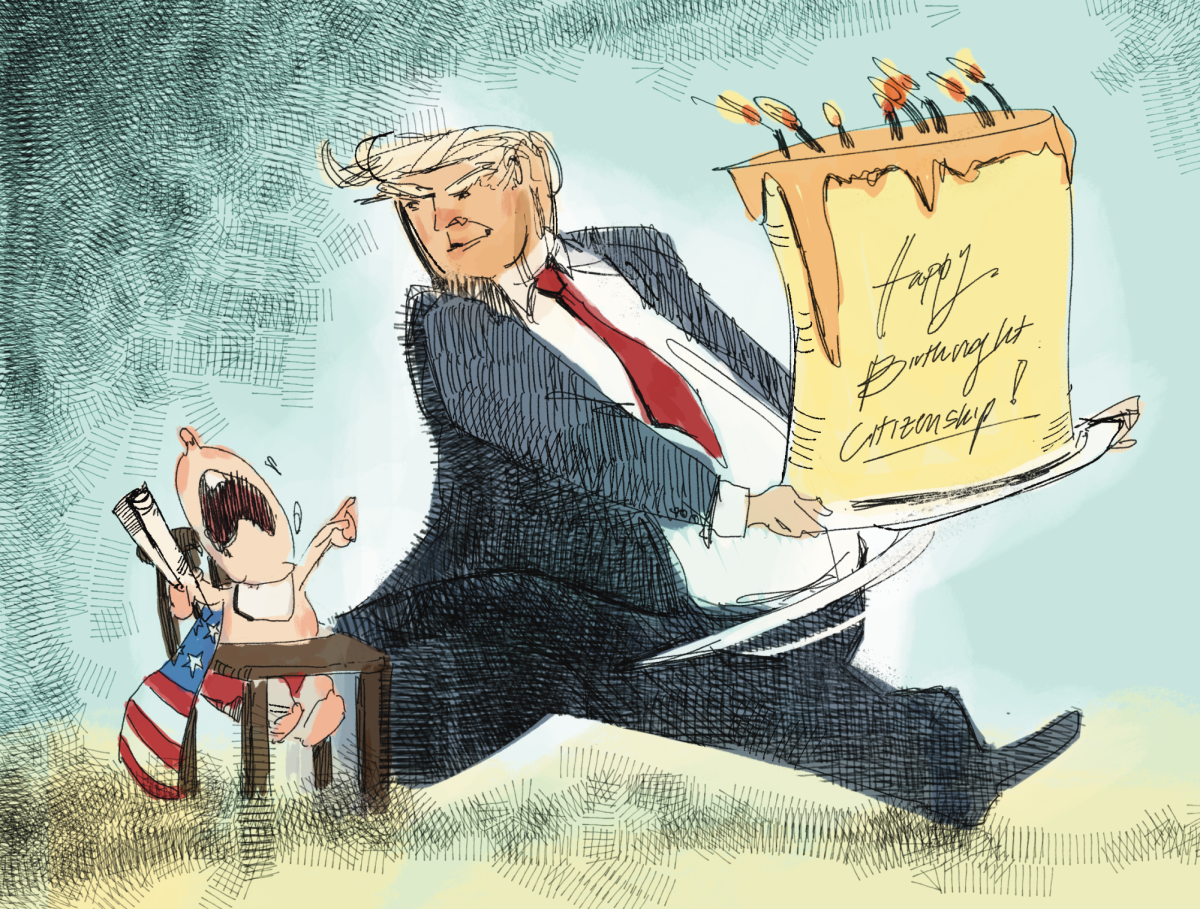Of the flurry of executive orders signed on inauguration day by President Donald Trump, most have been challenged and stalled in court. Trump has fully wielded — if not overstepped — the power of the executive, from attacking diversity, equity and inclusion initiatives to issuing mass deportations of illegal immigrants through his executive orders. But one stands out.
The order, titled “Protecting The Meaning and Value of American Citizenship,” dictates in order to obtain citizenship at birth, children born on or after Feb. 19, 2025 must have at least one parent who is a permanent legal resident, meaning they are a green card holder or a citizen of the United States. Otherwise, the child may apply for a dependent visa if their parents were on temporary visas, or else be a citizen of their parents’ country if they were undocumented at the time of their birth.
Three days later, the U.S. District Court for the Western District of Washington temporarily blocked the order from going into effect. Since then, the Trump administration has asked the Supreme Court to reverse the decision.
The attack on birthright citizenship seems like a play on populist rhetoric, but it has real consequences. Many of America’s political movements, from the Know Nothing Party in the 1800s to Trump’s actions today, were fueled by exploiting the fears of foreigners overwhelming the country — a fear of change.
This is a narrative that must be consistently challenged, especially in the case of the current executive order. Citizenship establishes a legal bond between a citizen and their country. A citizen is entitled to certain benefits, such as being treated equally under the law and receiving social services, while also giving back to the state by exercising their right to vote and serving in the military during a draft.
With approximately 11.7 million undocumented immigrants living in the United States based on 2023 numbers, many of whom are not married to legal permanent residents, the executive order, if implemented, would have millions of children being born alongside their peers but without any legal protections. Instead, they would be subject to deportation to a country they have never visited. Furthermore, the majority of these people would be unable to access legal pathways to citizenship because they do not have the family, employment or asylum status to qualify.
Restricting birthright citizenship creates a group of second-class citizens which is both immoral and impractical in terms of a functioning government. One of the founding American principles which initially set the United States apart from its European counterparts was that children were not beholden to pay for the sins of their parents.
If a parent committed a crime, the child did not have to pay for it. This set the foundation for class mobility — a child can move upward in society regardless of the social class they were born into. Yet under Trump’s executive order, we erase this idea since a decision by a parent to immigrate to the country illegally leaves their child permanently stateless and without the ability to access legal work and financial aid for university to advance in society.
Birthright citizenship is also critical to integration within American society. America, both historically and today, takes pride in its unique identity as an ethnically diverse nation unified through a shared system of values and culture. This is best achieved through birthright citizenship, allowing second-generation immigrants to assimilate into mainstream culture faster compared to their immigrant parents.
This shared American identity helps mitigate racial and religious tensions that frequently fuel divisive political rhetoric and the scapegoating of minority groups. The Campanile also criticizes the fact that many Americans whose European ancestors migrated to the US without the consent of Native Americans and claimed citizenship through birthright are now the ones shutting the door on others.
The Campanile also views Trump’s executive order as a direct defilement of the spirit of the Constitution. The 14th Amendment states, “All persons born or naturalized in the United States, and subject to the jurisdiction thereof, are citizens of the United States and the State wherein they reside.”
While Trump said his administration interprets the phrase “subject to the jurisdiction thereof” to exclude citizens who are not permanent residents of the United States, this language was also the same justification used in the 1884 Supreme Court case of Elk v. Wilkin, where Native Americans were denied U.S. citizenship since they were born on reservations, which supposedly were outside U.S. jurisdiction. Historically, this justification furthered inequities and violations against Native peoples, as it would if applied today.
This challenge to birthright citizenship shouldn’t be dismissed. In a time when temporary and permanent legal residents are deported and thrown in maximum security prisons due to “administrative error” or co-writing a student editorial expressing a political opinion, the Trump administration will only continue to infringe on the rights of immigrants if we allow them to. Trump has already expressed a willingness to stretch the bounds, if not outright defy, the right to due process — everyone, including native-born citizens, should be concerned.
In both practice and principle, eliminating birthright citizenship is regressive. The Campanile strongly condemns the Trump administration for overstepping its authority to threaten the civil liberties of millions and upset the foundational values of this country.

